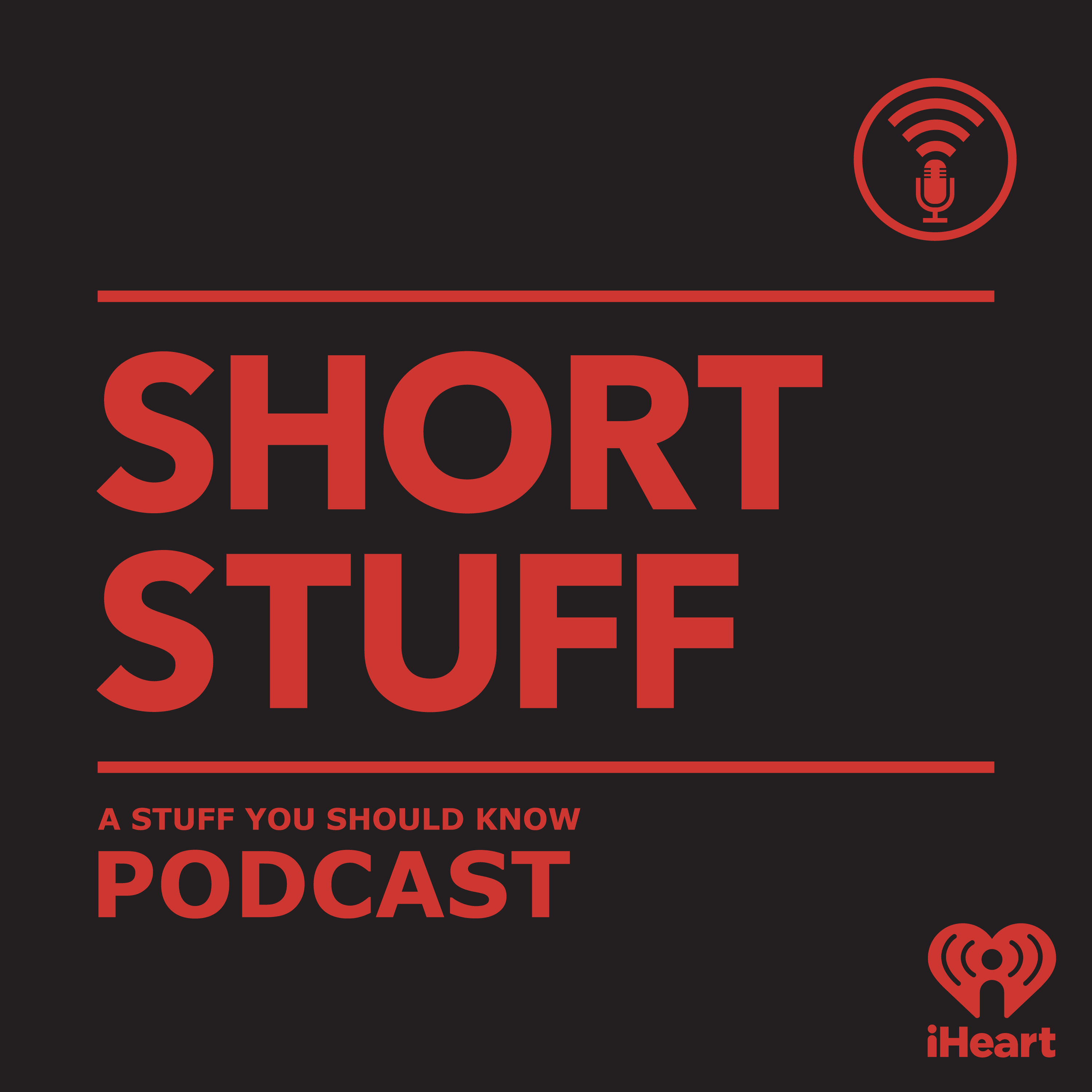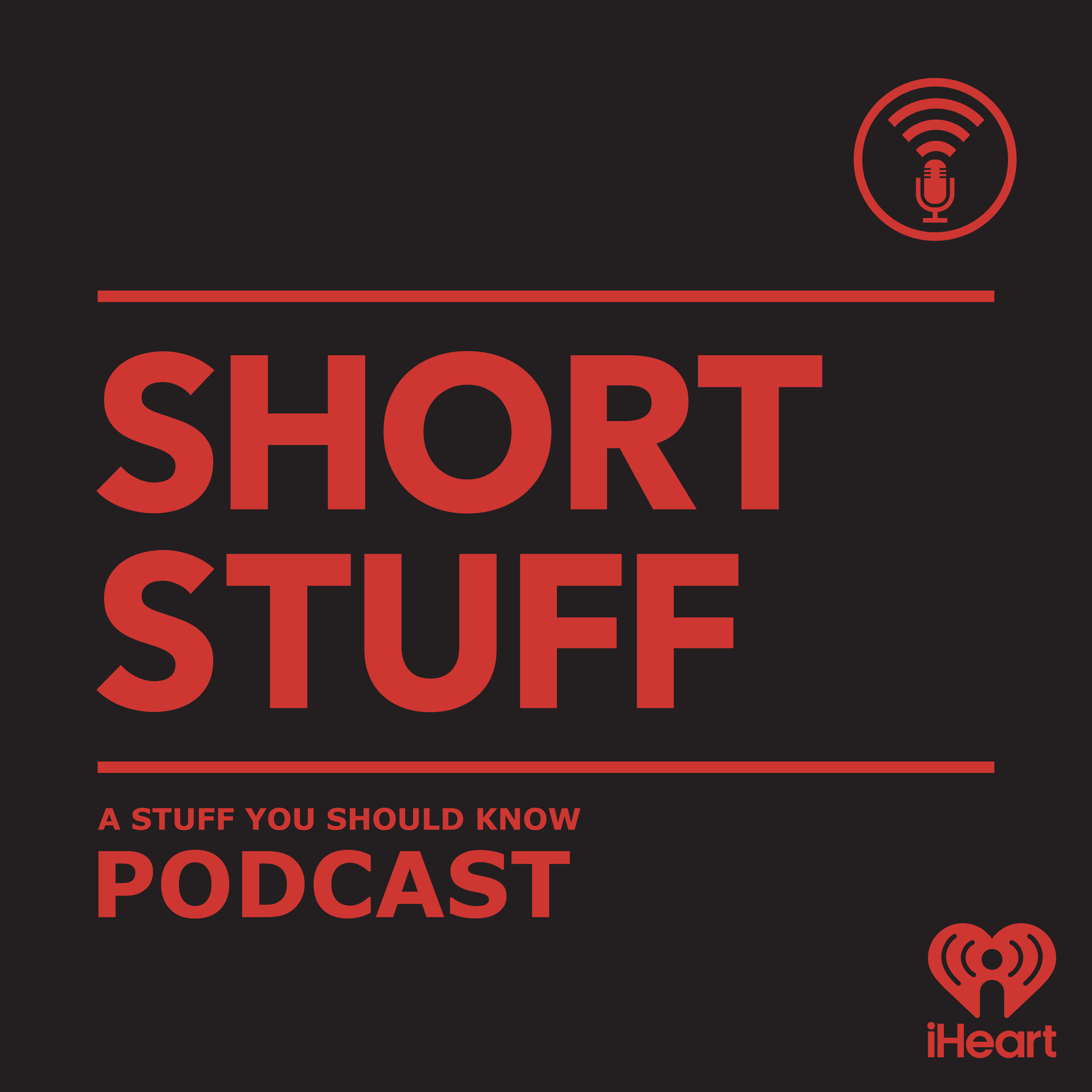Short Stuff: Alternative Libraries
Today we highlight and celebrate a couple of alternative libraries.
See omnystudio.com/listener for privacy information.
Press play and read along
Transcript
Speaker 1 This is an iHeart podcast.
Speaker 1 Living with a rare autoimmune condition comes with challenges, but also incredible strength, especially for those living with conditions like myasthenia gravis or MG and chronic inflammatory demyelinating polyneuropathy, otherwise known as CIDP.
Speaker 1 Finding empowerment in the community is critical.
Speaker 1 Untold Stories, Life with a Severe Autoimmune Condition, a Ruby Studio production in partnership with Argenix, explores people discovering strength in the most unexpected places.
Speaker 1 Listen to Untold Stories on the iHeartRadio app, Apple Podcasts, or wherever you get your podcasts.
Speaker 1 Hey, and welcome to The Short Stuff. I'm Josh, and there's Chuck, and we're sitting in for Dave today, and this is short stuff.
Speaker 2 That's right. And we are here today to talk about, this is sort of a two-parter in one, about, I'm just calling this alt libraries as an alternative libraries.
Speaker 1 Sure.
Speaker 2 One reason is because I was on a walk the other day, and we have quite a few little free libraries in our neighborhood, and they are all super cute. If you don't know what we're talking about,
Speaker 2 they're
Speaker 2 little boxes, usually in the shape of a house, or it could be a dog house, or it could be a literal library or schoolhouse, just some sort of small housey type structure with a little clear door.
Speaker 2
And inside are books that you can take a book, you can take a couple of books, you can leave a book. And it's just one of the great things.
And I grabbed one.
Speaker 2 I usually don't even look at them that much because I just have too many books I'm behind on already. But one popped up in my eye, peripheral vision, that would be perfect for Ruby.
Speaker 2 So I grabbed it, and she's reading it and loving it. And so I thought we should do a little ode to alt libraries like this.
Speaker 1 What was the book?
Speaker 2 I can't remember. The Last Kids on Earth or something like that.
Speaker 1 Oh, that sounds good.
Speaker 2 That may not be the title, but that's sort of the premise.
Speaker 1 She might be too old for this, maybe not. Um has she ever read any of the scary stories to tell in the dark books?
Speaker 1 Uh I don't think.
Speaker 2
And it is actually called The Last Kids on Earth. It looks like it's a series.
Um no. Uh that's that sounds like something right up her alley, though.
Speaker 1
Okay. Go to eBay and find whatever editions came out in the 80s.
Okay.
Speaker 1 Um because they have some of the greatest um illustrations ever that made everything so much more unsettling. You have to get those watercolor watercolor illustrations or else don't even bother.
Speaker 2 I'm looking at them now and they are terrifying.
Speaker 1
They are. It's so great.
I remember being a kid and just being like, this is this is so great. I feel so alive.
Thanks for the wreck. Yeah.
Speaker 1 There's also more scary stories of Tunnel in the Dark, pretty much equally good.
Speaker 2 So maybe we should flip it and start with Little Free Library since I mentioned that one first as inspirato.
Speaker 2 But in 29, how the story goes, and this is straight from their website, a man named Todd Boll from Wisconsin, Hudson, Wisconsin, started it all when he built a little model of a schoolhouse, of a little one-room schoolhouse as a tribute to his mom, who was a teacher,
Speaker 2
put it on a post, put some books in it, and said, Hey, everyone, if you want a book, take one. If you want to drop one off, that'd be great too.
And it was a big hit.
Speaker 1 It was a huge hit, actually. So apparently, Andrew Carnegie funded,
Speaker 1
I believe, $2,500 plus. For some reason, everybody says $2,508.
So I'm guessing that's the number. Public libraries around the turn of last century or early last century.
Speaker 1 And there's still plenty around
Speaker 1 that he essentially partnered with whatever local government and said, hey, I'll give you a bunch of money or I'll throw in half or something like that.
Speaker 1 And that was one of the big pieces of philanthropy he was known for.
Speaker 1 So I guess Todd Bolo and Rick Brooks said, let's try to see if we can make 2,508 of these things by the end of 2013, which is a couple years after they started.
Speaker 1 And they just blew that goal out of the water.
Speaker 2 Yeah.
Speaker 2 Rich Brooks was the guy, like you said, he partnered with. He actually retired from the, which is now an NGO in 2014.
Speaker 2
But he, you know, they were pals and he thought it was a great idea. And again, inspired by Carnegie, they set out to start building these by 2010.
So in 29 is when the first one was built.
Speaker 2 By 2010, it was like an established thing that was happening.
Speaker 2
They started to give them away. They had charter signs, if it was an official one, engraved with a charter number.
And it just, people were into it.
Speaker 2 And they started, you know, you see one of these things in your neighborhood. I remember when I saw the first one, I was like, wow, that's an incredible idea.
Speaker 2 And it felt like within that year, we had like six or seven more.
Speaker 1 Yeah, I remember the first time I saw one, I didn't get the concept. So I kind of
Speaker 1
had to have a book that I wanted. And so I looked around to make sure no one was looking and put it in my jacket and ran off really quick.
I thought
Speaker 2 you got a bunch of books and you sold them on eBay.
Speaker 1 No, I just took one
Speaker 2 and sold it on eBay.
Speaker 1 Yeah, eventually. But I said that when they started, they wanted to make $2,508
Speaker 1
of these things within a couple of years. They ended up surpassing that with a year and a half left before their goal date.
And they just kept going from there.
Speaker 1
Apparently, Chuck, here's some mind-boggling numbers for you. So they started in 2009.
In 2022, there were more than 150,000 little free libraries
Speaker 1 across the world in 120 different countries.
Speaker 2 Yeah, I did not know it had gone international until I started doing this research.
Speaker 2 It's just incredible. Like I said, Brooks retired in 2014.
Speaker 2 Someone actually wrote in 2015, a woman named Margaret, oh, she's a pretty famous author, actually. Margaret Aldrich
Speaker 2 wrote the little free library book.
Speaker 2 So all of a sudden it's like launching books in and of itself.
Speaker 2 They got in 2014, that same year, the Library of Congress Literacy Award.
Speaker 2
Just like people are lauding it. People are building these things like crazy.
And it's just become one of the cool things that the United, you know, started here in the U.S.
Speaker 2 and then spread all over the place. Very sadly, in 2018, Todd Bowl passed away from pancreatic cancer after the launch of their 75,000th at the time little free library.
Speaker 2 And he was working for them up until the end and has a great quote: I really believe in a little free library on every block and a book in every hand.
Speaker 2 I believe people can fix their neighborhoods, fix their communities, develop systems of sharing, learn from each other, and see that they have a better place in this planet to live.
Speaker 1
Very sweet. That is a great last interview.
quote.
Speaker 2 Yeah, pretty awesome.
Speaker 1 All right, well, let's take a break and we'll come back and talk about a different kind of alt library after this.
Speaker 2 Attention, parents and grandparents. If you're looking for a gift that's more than just a toy, give them something that inspires confidence and adventure all year long.
Speaker 2 Give them a Guardian bike, the easiest, safest, and number one kids' bike on the market.
Speaker 1 Yeah, with USA-made kids-specific frames and patented safety technology, kids are learning to ride in just one day with no training wheels needed.
Speaker 1 It's why Guardian is America's favorite kids' bike and the New York Times and Wirecutter's top pick three years in a row.
Speaker 2
That's right. My daughter has a Guardian bike and she loves it.
And that thing was really easy to put together.
Speaker 2 And get this, this holiday season, Guardian is offering their biggest deal of the year, over 40% in savings on all bikes plus $100 in free accessories.
Speaker 2 Guardian bikes have become one of the most sought-after gifts of the season and inventory is going fast, so don't wait. Join over a half a million families who've discovered the magic of Guardian.
Speaker 2 Visit guardianbikes.com to shop now.
Speaker 2 Support for the show today comes from public.com. You're thoughtful about where your money goes.
Speaker 2 You've got core holdings, some recurring crypto buys, maybe even a few strategic options plays on the side. The point is, you're engaged with your investments, and Public gets that.
Speaker 1 Yeah, that's why they built an investing platform for those who take it seriously. On public, you can put together a multi-asset portfolio for the long haul.
Speaker 1 Stocks, bonds, options, crypto, it's all there. Plus an industry-leading 3.6% APY high-yield cash account.
Speaker 2
Switch to the platform built for those who take investing seriously. Go to public.com slash SYSK and earn an uncapped 1% bonus when you transfer your portfolio.
That's public.com/slash SYSK.
Speaker 3
Paid for by public investing. All investing involves risk of loss, including loss of principal.
Brokerage services for U.S.
Speaker 3 listed registered securities, options, and bonds in a self-directed account are offered by Public Investing Inc., member FINRA and SIPC. Crypto trading provided by Zero Hash.
Speaker 3 Complete disclosures available at public.com/slash disclosures.
Speaker 1 Okay, Chuck, so we already talked about little free libraries, which anybody can make. And if you want some tips, like we said, go check out the little free library book.
Speaker 1 If you saw that in a little free library, wouldn't the universe just collapse in on itself?
Speaker 2 Yeah, you can also donate to them, of course.
Speaker 1 Yeah, it's that kind of give a book, take a book thing. I don't know if we spelled it out or if we needed to, but that's the premise of it, right? Yeah.
Speaker 1
Another thing was called the human Library. And this was the result of a couple of, who I take to be artists, brothers Ronnie Abergel and Danny Abergel.
Yeah, I have to.
Speaker 1 Yeah, they, for a festival in Denmark,
Speaker 1 about the year 2000, they created the human library in Danish. They call it Meneske Bibliotheket, but all one word.
Speaker 2 Yeah, bibliothek is, that's in a lot of languages, right?
Speaker 1
Sure. But you add the ET to the end, and you've got Danish.
Danish. That's right.
Speaker 1 So,
Speaker 1 what they created with this human library was the concept that the books were human beings, and there were human beings that people might want to get information from.
Speaker 1 So, there were human beings who were typically
Speaker 1 looked down upon, mistreated, had different experiences from the mainstream. So, you had like books that were trans people, unhoused people,
Speaker 1 people from different races.
Speaker 1 And you can check out one of these books, this human book, and hang out with them and ask them whatever question you want. And then you take them back and check out another one.
Speaker 2 Yeah, it's sort of part performance art, part TED talk in a way.
Speaker 2 Just kind of referring to them as books was the hook, I think.
Speaker 2 And obviously something to draw attention to their cause, which is very noble, I think.
Speaker 2 It started out as a small festival, and I think it ran eight hours a day for over four days initially with 50 human books available. And now it is an international thing.
Speaker 2 They have human libraries in Asia, Africa, Australia, both of the Americas and Europe.
Speaker 1 Yeah, I thought this was kind of cute too. So if you're a volunteer as a book,
Speaker 1 you go through a vetting process and then they teach you how to do this. And they call that getting published.
Speaker 2 Yeah, that's pretty fun.
Speaker 1 And then once you're published, you can be checked out. Yeah.
Speaker 1 And the rules for readers are that you respect the book, be curious, bring the book back on time, and in the same condition.
Speaker 2 I'm keeping this book.
Speaker 1 If you read between the lines, I think bring it back in the same condition means that they don't want any pages stuck together with a booger. Right.
Speaker 2 Yeah, don't make your book to your dishes.
Speaker 2 Don't put your book to work. That's not what this is about.
Speaker 1
Well, luckily, the book can end the loan anytime they want. Like if things go pear-shaped, they can be like, I'm taking myself back to the library.
Yeah.
Speaker 2 Just stamp my forehead so I can leave.
Speaker 1
Right. They also have mobile libraries called Book Depots.
The headquarters for this, that it just carried on for the last couple decades. It's headquartered in Copenhagen.
Speaker 1
But they have mobile libraries. And I guess they just go round up the books and they're like, sorry, you're published.
You're coming with us on the road for a little while.
Speaker 2 Yeah, you can also
Speaker 2
like book a group of books or, you know, check out a group of books at one time. Like Like a company can do this, and companies have done this.
They'll, you know, it's something that companies do.
Speaker 2
They'll bring in like guest speakers and stuff. And in this case, they're doing it in the form of human books.
They'll bring in a few different people to bring in to talk about
Speaker 2 things that, again, just sort of like an individual would. Like, hey, let's bring in some people that maybe don't even work in our field, but might enlighten you to some diverse topics
Speaker 2 and people and ways of thinking.
Speaker 2 So like Microsoft and Eli Lilly and other brands have gotten together to kind of do this over the years.
Speaker 1 Yes. And I think invariably at all of those events, there's at least one person who raises their hand and says, so wait, this is just QA? Right.
Speaker 2 Like, I don't get it.
Speaker 1
What's the library thing? I don't, yeah, I'm totally confused. Yeah.
And they probably don't get very much out of the experience.
Speaker 2
Exactly. Those people never do.
But yeah, it's just sort of a fun hook. I like stuff like this.
Some people might say it's silly. Oh, they're not books.
They're just people and it's just a Q ⁇ A.
Speaker 2 But I encourage people like that to sort of broaden broaden their horizons, think outside the old box a little bit, and
Speaker 2 CTFT.
Speaker 1 Yeah, just make sure that the person you're dragging off to be checked out is a published book and not just some rando.
Speaker 2
No, you don't want to do that. Hey, you're coming with me.
That's called kid.
Speaker 1 That's called kidnapping. Right.
Speaker 1 You got anything else?
Speaker 2
I got nothing else. Support Little Free Library.
Support the Human Book Project.
Speaker 1 And support all libraries, too.
Speaker 2 Yeah, those are great also.
Speaker 1 Short stuff is out.
Speaker 1 Stuff You Should Know is a production of iHeartRadio. For more podcasts, MyHeart Radio, visit the iHeartRadio app, Apple Podcasts, or wherever you listen to your favorite shows.



